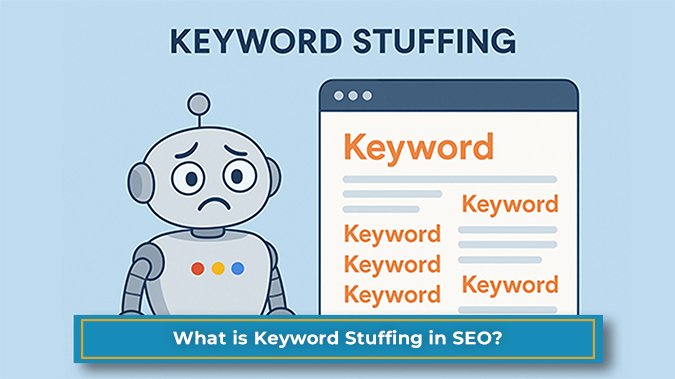What is Keyword Stuffing in SEO

Whether you are a blogger or business owner, do you know how your readers or customers will find your site? Using relevant keywords or phrases will help readers or customers to reach the best sites. Google will rank sites when your content contains the same words as a search query. If those relevant keywords appear in the heading or body text of the webpage then google will show your site.
Do you think it's simple to just insert lots of identical words in content? No. It's easy to get noticed by Google when you use lots of keywords in your content. But, inserting plenty of keywords or phrases is called keyword stuffing and is not recommended at all. What exactly is the impact of keyword stuffing in SEO, will be explained in this blog.
What is Keyword Stuffing?
A higher ranking on your website means more users find or visit your site pages and become customers. Including relevant, updated and high quality content, relevant links or good metadata will help you to rank higher on websites. But, the main strategy used to optimize SEO components of content marketing is using keywords and phrases inside the content of your website. Identical words and phrases reflect what customers use when searching for any services or products.
Keyword stuffing is a spam strategy that refers to excessive use of keywords in on-page content with the aim of higher rankings in SERP. SEO detects when keywords are used abnormally like out of context, too close together or when they appear in content. When this happens search engines will decrease websites ranking in search results. Keyword stuffing is a part of black-hat SEO strategies and is listed as spam in Google policies.
How Keyword Stuffing can Harm SEO
Keyword stuffing is harmful to Search Engine Optimization because it leads to low-quality content. It also reduces the user experience of your website. Overloading your content with multiple keywords can make your website's content completely unreadable. When a user or customer finds website content spammy or illegal they click off immediately. This shows less dwell time, higher bounce rate and fewer conversions with lower ranking.
● Penalties: Google may penalize your site or content by lowering its ranking and removing it from search results.
● Bad User Experience: Excessive keyword content may be difficult to read and not engage users. Users may leave site pages and search for other relevant content.
● Brand Damage: If your content is stuffed with keywords, you may cause brand damage. If users find your content to be of low-quality then they may lose trust in your brand.
● Loss of Users: Users find content aimed at increasing rankings rather than engaging them, they will click off instantly. It means your user sees multiple repetitions of keywords and they will look at other sites.
Keyword Stuffing Examples
Here we provide SEO keyword stuffing examples to understand what it is and why to avoid it.
|
Keyword stuffing in a blog post content is bad for SEO because Keyword stuffing leads to low-quality content. Keyword stuffing is a black-hat SEO strategy that involves using too many keywords. Keyword stuffing is no longer effective and keyword stuffing can lower site rankings. Always avoid keyword stuffing in blog posts or content. |
In the above example, the word “keyword stuffing” has been used 6 times in a small paragraph with 53 words. This is highly unacceptable and results in penalties from search engines like Google. The above paragraph is not interactive for people to read so users will immediately leave the site.
To avoid keyword stuffing in SEO, naturally use relevant keywords in content. You can utilize specific keywords in headings, titles, and merge them into the body of the content. Also, you can aim for a keyword density 2% or less.
How to Avoid Keyword Stuffing in SEO
Create high-quality content that engages your audience to avoid keyword stuffing. Create interactive content for humans, not for search engines ranking. Also, conduct through keyword research to identify relevant keywords and phrases for your content. Add secondary keywords or phrases, synonyms, and long-tail variations throughout your website's content.
Here we provide information on how to avoid keyword stuffing.
Conduct Quality and In-depth Research
Researching into target industry monitoring what is popular and analyzing keyword difficulty are all crucial components of good keyword research. Knowing keyword popularity is essential, it shows how often a keyword is searched for. Use a research tool to discover relevant words and phrases for your content.
Extend Word Count
Expanding the content body of text is a good way to avoid keyword stuffing. This allows them to allocate keywords more precisely and naturally rather than stuffing them in every sentence. It will raise content fluency and user experience.
Avoid Unnecessary keyword
Avoid adding irrelevant keywords everywhere in your content.
Measure Keyword Density
Check percentage of ideal keyword density is around 2% in your content. Density checkers ensure that the percentage is below given percentage and keep content in a natural way.
Give Each Page Primary Element
Obtain one specific keyword or phrase for each and it should be related to page content. Include specific primary keywords in title, first paragraph and conclusion. Selecting less competitive phrases or words can rank quicker. Always keep in mind that, select various primary keywords for your website pages.
Use Long-Tail Keywords
Long-tail keywords have lower search traffic on the site but have high purchase intent.
Search engines will not rank high if you add unnecessary keywords to your content. So, always aim to create relevant and high-quality content.
Conclusion
By prioritizing high quality content, user experience will rank high for search engine result pages. Your reader or customer should be your primary aim, to engage them with relevant content. Adding overloading words and phrases in your content may lose customers. So make sure of avoiding keyword stuffing. Do proper research and focus on building quality content for your customers or readers.
FAQs on Keyword Stuffing in SEO
What is the ideal keyword density for SEO?
It is a metric that measures the often keyword use in content. Most SEO suggests ideal keyword density should be between 1 to 2%.
Can keyword stuffing cause penalties from Google?
Yes. One of the consequences of keyword stuffing is it can result in penalties from search engines like Google.
How does keyword stuffing affect user experience?
Keyword stuffing negatively affects the user experience by making content unnatural, difficult to read, leading bounce rates and poor engagement.






